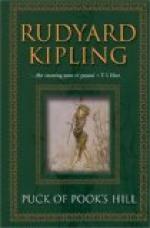’"And now,” said De Aquila, “half the great Barons of the North and West are out against the King between Salisbury and Shrewsbury, and half the other half wait to see which way the game shall go. They say Henry is overly English for their stomachs, because he hath married an English wife and she hath coaxed him to give back their old laws to our Saxons. (Better ride a horse on the bit he knows, I say!) But that is only a cloak to their falsehood.” He cracked his finger on the table, where the wine was spilt, and thus he spoke:—
’"William crammed us Norman barons full of good English acres after Santlache. I had my share too,” he said, and clapped Hugh on the shoulder; “but I warned him—I warned him before Odo rebelled—that he should have bidden the Barons give up their lands and lordships in Normandy if they would be English lords. Now they are all but princes both in England and Normandy—trencher-fed hounds, with a foot in one trough and both eyes on the other! Robert of Normandy has sent them word that if they do not fight for him in England he will sack and harry out their lands in Normandy. Therefore Clare has risen, FitzOsborne has risen, Montgomery has risen—whom our First William made an English Earl. Even D’Arcy is out with his men, whose father I remember a little hedge-sparrow knight nearby Caen. If Henry wins, the Barons can still flee to Normandy, where Robert will welcome them. If Henry loses, Robert, he says, will give them more lands in England. Oh, a pest—a pest on Normandy, for she will be our England’s curse this many a long year!”
’"Amen,” said Hugh. “But will the war come our ways, think you?”
’"Not from the North,” said De Aquila. “But the sea is always open. If the Barons gain the upper hand Robert will send another army into England for sure, and this time I think he will land here—where his father, the Conqueror, landed. Ye have brought your pigs to a pretty market! Half England alight, and gold enough on the ground”—he stamped on the bars beneath the table—“to set every sword in Christendom fighting.”
’"What is to do?” said Hugh. “I have no keep at Dallington; and if we buried it, whom could we trust?”
’"Me,” said De Aquila. “Pevensey walls are strong. No man but Jehan, who is my dog, knows what is between them.” He drew a curtain by the shot-window and showed us the shaft of a well in the thickness of the wall.
’"I made it for a drinking-well,” he said, “but we found salt water, and it rises and falls with the tide. Hark!” We heard the water whistle and blow at the bottom. “Will it serve?” said he.
’"Needs must,” said Hugh. “Our lives are in thy hands.” So we lowered all the gold down except one small chest of it by De Aquila’s bed, which we kept as much for his delight in its weight and colour as for any of our needs.
’In the morning, ere we rode to our Manors, he said: “I do not say farewell; because ye will return and bide here. Not for love nor for sorrow, but to be with the gold. Have a care,” he said, laughing, “lest I use it to make myself Pope. Trust me not, but return!"’




